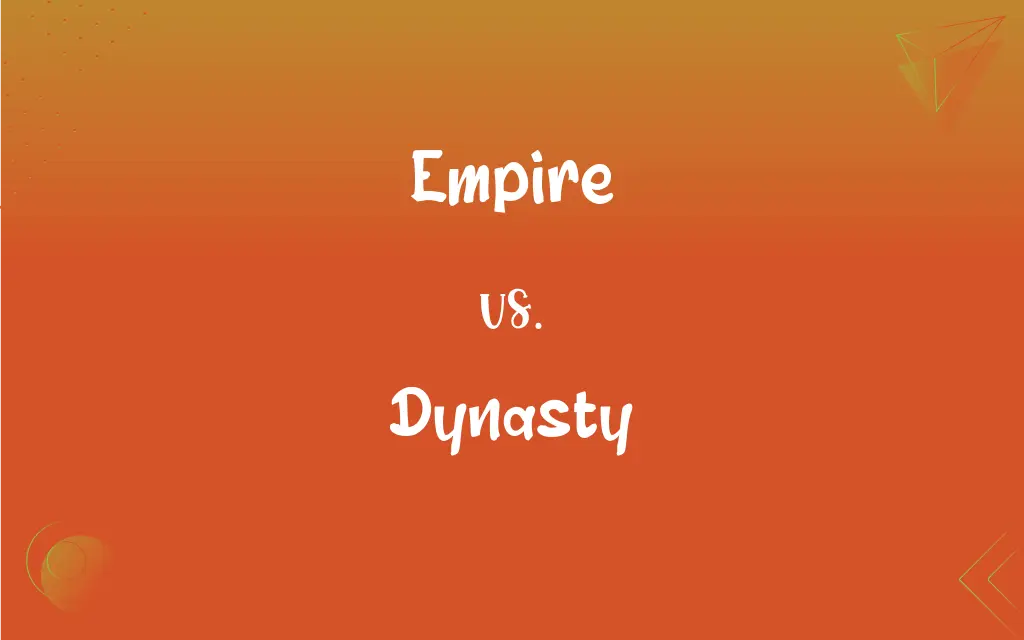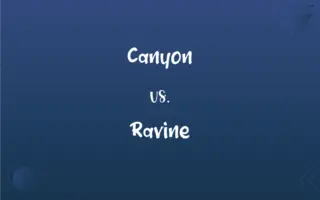Empire vs. Dynasty: What's the Difference?
Edited by Aimie Carlson || By Harlon Moss || Updated on November 6, 2023
An empire is a group of nations or peoples ruled over by an emperor or other powerful sovereign or government.A dynasty is a succession of rulers from the same family, usually in the context of a feudal or monarchical system.

Key Differences
An empire is a political construct, where a single authority, usually an emperor or empress, rules over multiple territories and peoples, often of diverse cultures and languages. A dynasty refers to a sequence of rulers from the same family, especially when they continue over many generations. While empires are defined by their expansive control and governance structures, dynasties are defined by the familial lineage of those who rule.
Empires often arise through conquest and are characterized by their vast territories and influence, such as the Roman Empire or the British Empire. Dynasties, such as the Tudors in England or the Ming in China, are characterized by the family name and bloodline of those sitting on the throne, regardless of the size of the territory they govern.
While an empire can last across different dynasties, with rulers from different families coming into power, a dynasty can rule over different forms of government, not necessarily empires. For example, the Ottoman Empire was both an empire in terms of its large, multi-ethnic territory and a dynasty named after its founding father, Osman I.
The success of an empire is typically measured by its political and military strength, economic power, and cultural influence. In contrast, the success of a dynasty is often measured by its duration, the stability it provides to the realm, and the legacy of its rulers. Empires can encompass multiple nations and cultures, whereas dynasties are more about the continuity of leadership within one nation or culture.
Comparison Chart
Definition
A sovereign state ruled by an emperor or empress
A sequence of rulers from the same family
ADVERTISEMENT
Focus
Territory and governance
Familial lineage and succession
Duration
Can exist across multiple dynasties
Measured by the reign of a single family
Scope
Often multinational and multicultural
Limited to the rulers' lineage within one culture or nation
Example
The Roman Empire
The Qing Dynasty
Empire and Dynasty Definitions
Empire
A group of nations or territories ruled by a single sovereign authority.
The sun never set on the British Empire at its peak.
ADVERTISEMENT
Dynasty
A series of members of a family who are distinguished for their success or power.
The Medici dynasty was known for its patronage of the arts during the Renaissance.
Empire
A large and often culturally diverse political unit.
The Mongol Empire stretched across much of Eurasia in the 13th century.
Dynasty
A line of hereditary rulers of a country.
The Han Dynasty is considered a golden age in Chinese history.
Empire
A state or government of significant size, power, and influence.
The Byzantine Empire was a continuation of the Roman Empire in the east.
Dynasty
A succession of rulers from the same family or lineage.
The Habsburg dynasty ruled over Austria for centuries.
Empire
A realm or territory in which a single ruler holds supreme authority.
Napoleon declared himself Emperor of the French Empire.
Dynasty
An era during which a family reigns.
During the Tudor dynasty, England experienced significant religious and political changes.
Empire
An extensive operation under the control of a single individual or organization.
He built a media empire from the ground up.
Dynasty
The period during which a single family maintains power.
The Joseon Dynasty governed Korea for more than five centuries.
Empire
Of, relating to, or characteristic of a neoclassic style, as in clothing or the decorative arts, prevalent in France during the early 1800s.
Dynasty
A succession of rulers from the same family or line.
Empire
A variety of apple having dark red skin and white flesh.
Dynasty
A family or group that maintains power for several generations
A political dynasty controlling the state.
FAQs
Is a dynasty always associated with royalty?
Typically, yes, a dynasty involves a sequence of rulers from the same family lineage, often associated with royalty.
Did all empires have emperors?
Most empires had emperors, but some might have been ruled by other monarchical figures or governing councils.
What is an empire?
An empire is a large political structure comprising multiple territories and peoples, usually ruled by a single sovereign authority, often an emperor.
Can an empire consist of multiple dynasties?
Yes, over time, an empire may be ruled by several different dynasties.
What's a notable example of a dynasty?
The Ming dynasty in China or the Tudor dynasty in England are notable historical examples.
What is a dynasty?
A dynasty is a sequence of rulers from the same family, usually in the context of a feudal or monarchical system, often a succession of hereditary rulers.
What defines the end of a dynasty?
A dynasty ends when there is no successor from the same bloodline, or the ruling family is overthrown or replaced.
Can a dynasty extend beyond one empire?
Yes, some dynasties have ruled over more than one empire or kingdom, either successively or simultaneously.
What's the difference between a kingdom and an empire?
A kingdom is typically a single nation or territory ruled by a king or queen, while an empire is larger and encompasses several regions or peoples.
How does succession work in an empire?
Succession in an empire varies, sometimes involving hereditary transfer, selection by a governing body, or even conquest.
How long does an empire last?
Empires can last for centuries or a few years, depending on various factors like governance, economics, military power, and external pressures.
Is "dynasty" used in modern politics?
Yes, "dynasty" is sometimes used to describe a succession of leaders from the same family in modern republics or other non-monarchical systems.
What role does inheritance play in a dynasty?
Inheritance is key in a dynasty, with power typically passed down through family lines.
Do dynasties still exist today?
While the traditional concept of a ruling dynasty is less common today, some countries like Japan still recognize a ceremonial dynasty.
Why do dynasties fall?
Dynasties may fall due to internal strife, loss of public support, economic failure, or military defeat.
What impact do dynasties have on culture?
Dynasties often shape and patronize cultural developments, arts, and architecture, leaving lasting legacies.
What are the characteristics of an empire?
Empires are characterized by extensive territories, diverse cultures, centralized control, and a strong military presence.
Have empires always been expansionist?
Most empires have pursued expansionist policies to acquire resources, land, or influence.
Can an empire exist without conquering other nations?
While rare, some empires have expanded through trade, vassalage, or personal unions rather than outright conquest.
Can empires be democratic?
While empires historically have been autocratic, some modern examples have incorporated democratic elements, albeit rarely in pure form.
About Author
Written by
Harlon MossHarlon is a seasoned quality moderator and accomplished content writer for Difference Wiki. An alumnus of the prestigious University of California, he earned his degree in Computer Science. Leveraging his academic background, Harlon brings a meticulous and informed perspective to his work, ensuring content accuracy and excellence.
Edited by
Aimie CarlsonAimie Carlson, holding a master's degree in English literature, is a fervent English language enthusiast. She lends her writing talents to Difference Wiki, a prominent website that specializes in comparisons, offering readers insightful analyses that both captivate and inform.































































